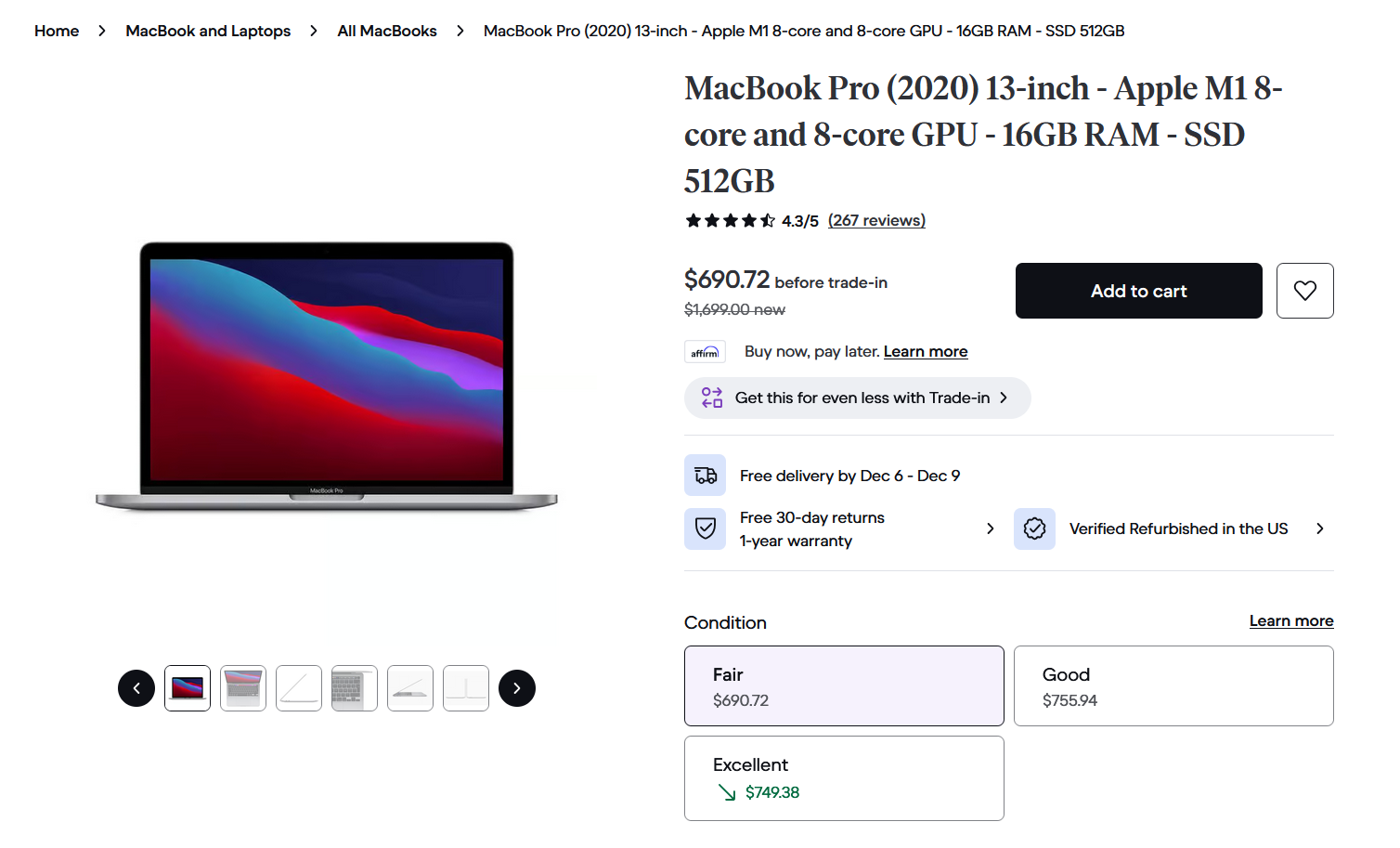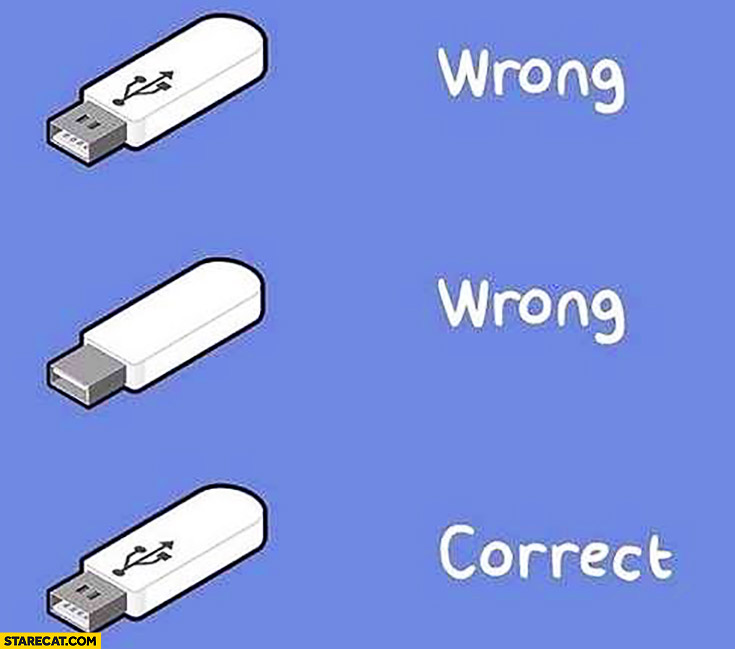And there’s the soldered RAM and storage, and glued-in or screwed-in battery…

This is my ~8 month old work laptop.
Is a Dell.
2 usb c not pictured.
You have options.
As long as you’re not an apple cult member you do.
Apple brought back the mag charger.
I wish it still had the SD reader and one A port, but it doesn’t really come up that often. Just 3D printing and only because I’m too lazy to set up a octoprint server or whatever.
MBPs all have HDMI and SD slots… but Definitely set up the octopi with a cheap webcam. I’ve run one for years now and it’s so nice to be able to kick off and check on prints from my phone. Not to mention it doesn’t matter what computer I slice on and the files are small enough that I have gcode for almost everything I’ve printed for instant access to reprint whenever.
they do have SDXC card readers:
2024 16" macbook pro: https://support.apple.com/en-ca/121554
- Charging and Expansion
- SDXC card slot
- HDMI port
- 3.5 mm headphone jack
- MagSafe 3 port
- Three Thunderbolt 5 (USB-C) ports with support for:
- Charging
- DisplayPort
- Thunderbolt 5 (up to 120Gb/s)
- Thunderbolt 4 (up to 40Gb/s)
- USB 4 (up to 40Gb/s)
An octopi is a fun project, for mine I printed a new internal enclosure for the mainboard that has mounts for the pi, so the printer is completely integrated with it (never did finish setting up the internal power routing to power it directly off the power supply, but that’s also completely doable)
I was recently convinced that the M1 MBP is one of the cheapest and most cost effective laptops on the market right now. I know it sounds crazy but it appears to be true. You can get a m1 mbp refurbished (sometimes with warranty) for anywhere between $400 - $700. Making it a budget laptop. It also destroys anything in that price range in terms of performance and what you are getting.
We bought ours when it first came out after several terrible windows laptops. It still runs like new and there’s hasn’t been any need to consider upgrading (m1 air in our case). The biggest complaint is once or twice a year I need a usb c to an adapter for an old device or something.
I’m not in the Apple ecosystem but I have a 16" 32GB M1 MBP. It was given to me when I started my job as my work machine and the thing is a beast especially comparing it to all the terrible laptops Apple came out with prior (removal of mag safe, addition of touch bar, the keyboard issues). I still use that laptop for work today and it honestly doesn’t even feel like it’s aged a day. Everything is still extremely fast and I use my work laptop 8 hours a day for extremely demanding tasks (I’m a dev so things like running dozens of docker containers, compilation, Android emulators, multiple IDEs, etc).
Honestly agreed. For the majority of users that just do light office work and browsing it is a great piece of technology. Although i would say it is less about performance (because those people would be fine with even less) and more about build quality, battery life, fanless design and good screen.
The one issue i have with it is the 256gb non-removable storage. More actually than the 8gb RAM, which tbh for many people is enough for casual use.
I am still waiting for anyone not named apple to release a similarly priced fanless laptop with good build quality. With lunar lake it should finally be possible imo.
If you spend a little more (like $700) you can get 16gb ram and 512gb. For performance I think “light office work” is selling it short. It’s more than capable of handling heavy office work IMO.
Yeah, I guess it depends on what kind of work. I thought that for demanding office stuff the 8gb RAM might end up mattering after all.
But your $700 with warranty are an amazing deal that make this irrelevant. That really only leaves the single external monitor (without using workarounds) as downside.
Where I am in Europe however I don’t think I could find the better specced models anywhere close to that price
Link for the sales or it didn’t happen.
Thanks for the link, I thought refurbished meant it would have warranty. Cool price if you’re on a pinch although personally I would not gamble on it without a warranty.
While I personally prefer this, I’m going to guess that the majority of people are generally not going to be using more than 2 or three usb ports at once. My take is that for most people, 2 Cs, an A, DP or HDMI would be optimal.
The availability of BT and wifi peripherals make this acceptable for many.
I still have a cutting plotter that uses RS232, but that’s connected to an oldish desktop, on the network, so a laptop never gets connected physically.
I’m not saying that this is good, simply that this is probably acceptable for many.
I have the same mac pictured above, and also a windows laptop with many ports.
The mac I plug into my work center via a single usb-c connection which charges it, connects it to my external monitor, and connects it to all of my USB equipment (about 6 items ranging from m&k to music equipment). Having only the one wire is huge in terms of making it easier to break down the machine from its setup and pack it up for the road.
The pc is connected separately to power as it can’t be powered through the usb-c, and to the monitor separately for some esoteric reason. So then I need a third cable to connect it to my equipment.
So in my case the less-is-more approach is actually preferable
that all being said
I’m sure other windows laptops can be configured with a one-wire solution just fine. And I don’t mean to pretend the 2x usb-c config was a popular choice or anything. Only on like two models or something had it. The newer macbooks brought back sd card slots and hdmi and everything by popular demand.
I looked into it and you can still run everything off of just one usb-c on those ones, so at the end of the day more options is just better for more people
Yep. My work laptop:

It’s beautiful.
Dell makes some fantastic enterprise laptops
Haha I have almost exactly the same one. Probably a slightly older model. Works for most stuff but mine only has 8GB RAM which is a bit of a killer…
It’s most likely expandable, have you checked?
It’s a work laptop, not really my place to go fiddling with it, unfortunately
Look at all those ports I’ll never need
We should have had USBC 20 years ago.
It’s still cool to have options
That’s what prisoners say. You are so conditioned to it that you prefer it.
Your other comments are less nonsensical, so I’ll only focus on this one.
- Prisoners don’t say this
- More options is freedom, literally the exact opposite of being imprisoned
- Recognizing reality is conditioning…?
- You can’t just say the opposite of something factual is true, that’s what MAGAts do
- Oh
My point was that defending the pissing contest over standards that gave us consumers six ports instead of one to do all the same tasks really misses the mark, imo.
You should probably look in a mirror, Mr. Prisoner.
You’re the one asking to be constrained.
What model of Dell is that?
Precision 3581
The apple bois wont appreciate this
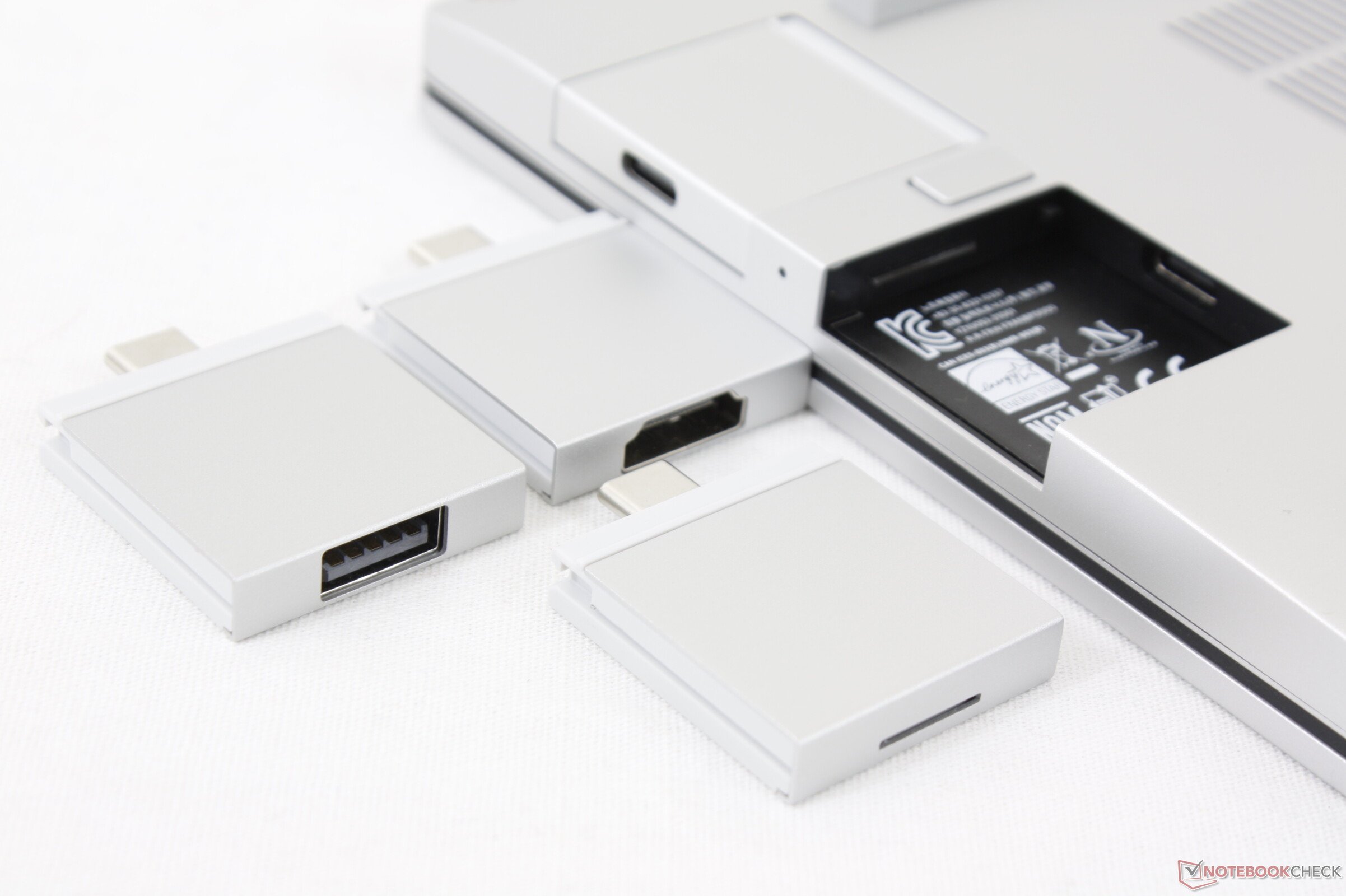
That’s the way to do it. I just wish Framework had a better selection of modules available and had more module bays on their laptops.
That’s hot af
In case you’re not aware, that’s a Framework laptop.
One more reason for me to get one. Dammit.
Is it still owned by LTT? I don’t particularly like this LTT though.
I have a framework, and while this system is pretty cool, I don’t change the cards often and I only have 4 cards. I’d rather have some more built-in ports too.
Framework users: “Yeah, but my USB-C ports are recessed!”
still only 4 ports thou
ok but where’s the pcmcia slot! /sees myself out
What a waste of chassis space.
As someone who daily drives a laptop for work and does field work on server facilities, finding a modern replacement that has both a RJ45 port and square USB (USB-A?) ports available on both sides, has been a pain in the hassle.
And I’m not even crying over the loss of VGA any longer. That one I can live without.
I’m no Apple fanboy (never owned a product of theirs and never will) but to be fair, those two USB-C ports can do everything the old, removed ports can do and more. The real crime here is not putting enough of them on the laptop.
Edit: The only port I’ll lament the removal of is the headphone jack. USB-C headphones are rare, adapters get lost, and bluetooth headphones compress the audio and have input lag. Everything else can go, though, and won’t be missed. (Okay fine ethernet can stay too.)
But my existing mice, keyboards, monitors, printers, and more don’t use those ports.
So now people get to carry around an external hub just to plug in damn thumbdrive.
Those threads are so funny. One day, we see people talking against planned obsolescence and the environmental impacts of the tech industry. The other day, the same people are cheering for removal of backwards compatibility and happy to throw away their stuff to buy new ones, and even making peer pressure on the ones who don’t do the same so they feel “antiquated”.
Or just permanently put a c to a adapter on the USB cable of the mouse?
USB-C keyboards & mice have been around for years. I switched to USB-C almost half a decade ago and haven’t looked back.
Regardless, you can easily mod your existing gear to USB-C with just a screwdriver and a soldering gun (or electrical tape if you’re lazy like me).
So your solution is for people to either throw away perfectly-good products (Logitech mice still don’t have USB-C receivers btw), or learn to hack something together?
My laptop from 2018 ago is no thicker than a modern laptop and managed to have 2 USB-A, 2 USB-C, a power adapter port (though it also supports PD), an SD card reader, and a headphone jack.
Now that PD is a better standard and power bricks had no standard, I can see dropping the power port for another Type-C port for a lower-power laptop that can’t draw more power than PD can deliver, but there’s no justification for dropping the other ports that are “still” standards being used by new devices.
Apple’s MacBook Pro includes HDMI and a third usb/Thunderbolt port alongside an SDXC and headphone jack (the latter of which is on all their laptops albeit on the other side). This seems like the perfect balance for most users.
It’s nonsense they don’t include HDMI on the Air, but then “it’s kinda thin and kinda light”.
I was not sad to see FireWire and mini-DisplayPort replaced with usb-c/thunderbolt.
Current port line up on “pro” machines:
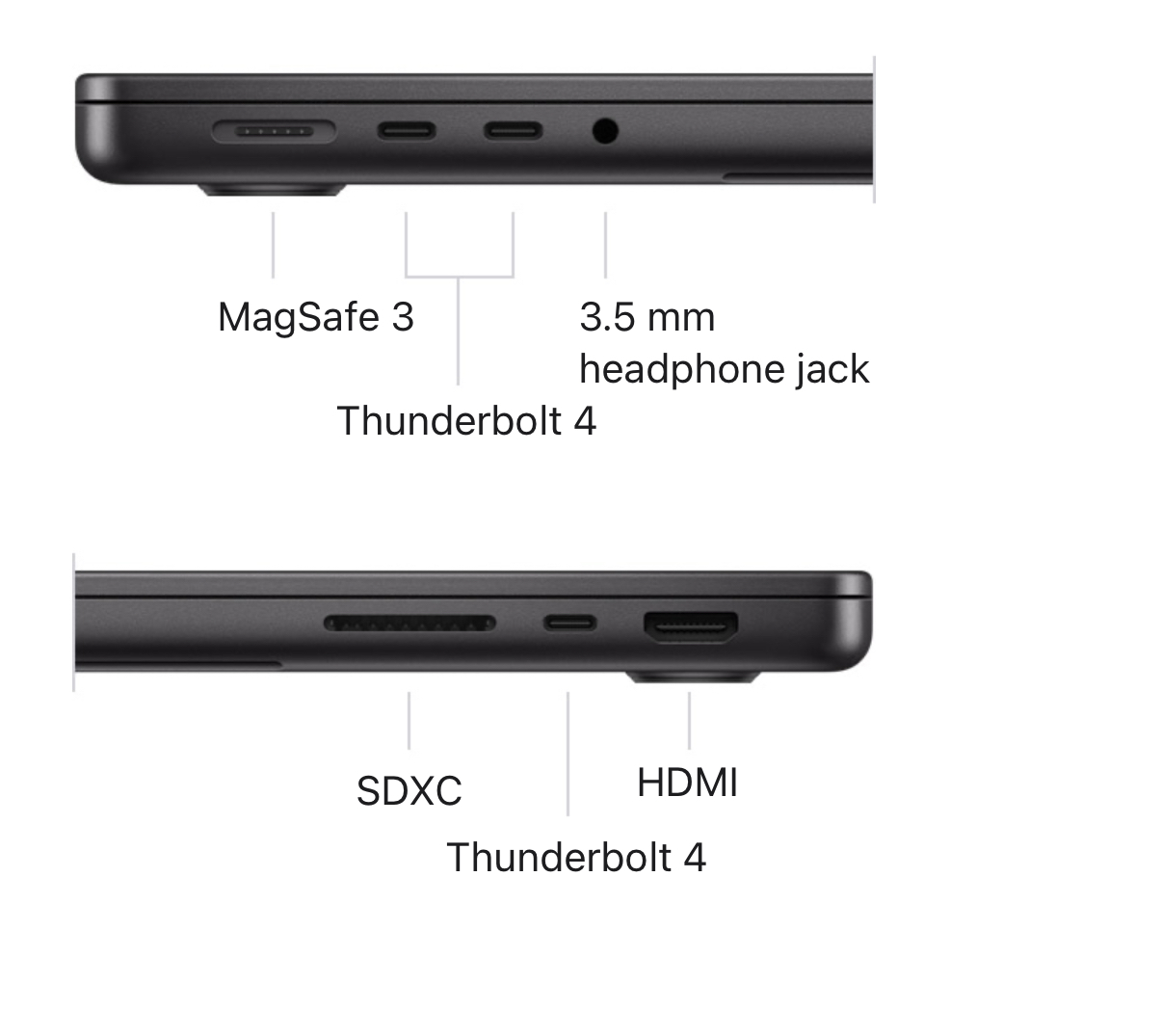
Add 3-4 more USB-C/Thunderbolt ports and that is a perfectly adequate setup (especially since one will be taken up by the charging cable if you don’t have a dock, and even then I could get by). I’m actually impressed that there are so many ports on it…for an Apple laptop.
It’s a laptop, do you really need 7 USB C / Thunderbolt ports on a laptop? You can always plug in a dock and get multiple other ports when you’re set up at a desk.
When I’m not at a desk I rarely have anything at all plugged in. Maybe power if I’m going for a long time, but the Pro has its own power adapter. Maybe a USB stick for a minute or two.I can’t imagine having 3 things, in addition to power and headphones, plugged in while I’m not at a desk. At a desk it’s probably more convenient to have a dock so you can have a bunch of things permanently plugged into the dock (keyboard, mouse, screens) that require just 1 plug to the laptop before they’re ready to go.
We get it, you don’t understand how usb bus works
what about hdmi?
like i get it, displays work ovee typec. but most monitors you’re gonna find in the wild still use hdmi and being able to just plug your laptop in is a godsentThe new MacBook pros do have a HDMI port.
For some yes, for some not.
My ideal minimum is this: 3x USB-C with support for slow 5V charging, 3x USB-A, 1x RJ-45 Ethernet (not some shit like ThinkPad Ethernet extension), 1x HDMI or 1x DP++, 1x DB9 serial port, 1x MicroSD or 1x SD slot (flush when inserted), 1x 3.5mm combo jack.
My work laptop is a dell xps and it’s the same, 3 USB c and that’s it. One gets used for charging. It came with a c to HDMI and A adapter. Basically forces you to need a dock at the desk and carry a bunch of adapters for anywhere else. Even just 1 type A for the mouse receiver would be nice because logitech still don’t make type C receivers.
I know it sucks to buy another thing. But a Bluetooth mouse would fix your issue. I had the same problem and evenually had to cave and buy a wireless Bluetooth mouse.
Except none of the GOOD nice are bluetooth.
You monitor is the dock. Just a simple USB c 40gb/s connecting monitor and PC and everything is connected to the monitor, like mouse, keyboard, cam, etc.
I like it more like this.
The sd card reader is cool too
Agreed. Also I’ve had a number of MBPs for work and they have all had headphone jacks.
to be fair, those two USB-C ports can do everything the old, removed ports can do and more
To connect to a device that’s 100 meters away at an appreciable speed (and beyond that at lesser quality), one still kind of needs Ethernet. Can be accomplished with an adapter, though.
Did you read my edit?
Nope, I think I must have written my reply while it hadn’t propagated here.
There’s a headphone jack on the other side. I don’t think Apple make a computer without a headphone jack. Most models have more than two USB-C ports as well and all current models have a dedicated “Magsafe” charging port.
um the headphone jack went nowhere, what are you talking about???
2024 16" macbook pro: https://support.apple.com/en-ca/121554
- Charging and Expansion
- SDXC card slot
- HDMI port
- 3.5 mm headphone jack
- MagSafe 3 port
- Three Thunderbolt 5 (USB-C) ports with support for:
- Charging
- DisplayPort
- Thunderbolt 5 (up to 120Gb/s)
- Thunderbolt 4 (up to 40Gb/s)
- USB 4 (up to 40Gb/s)
Can USBC be used for audio if headphones start using a USBC plug?
Yes, and it works with every pair of headphones. Like I said, all you need is an adapter. It isn’t difficult to cut and splice some wires to make your own USB-C headphones, either.
This is nonsense, you don’t just need an “adapter” to convert a 3.5mm to USB-C. What you talking about is a DAC or external soundcard. Just because they can make them small doesn’t make it an adapter and since the laptop clearly already has a DAC and amplifier since it has working speakers, it is silly to make me buy another, especially since the majority of external tiny DACs sounds like crap and are underpowered.
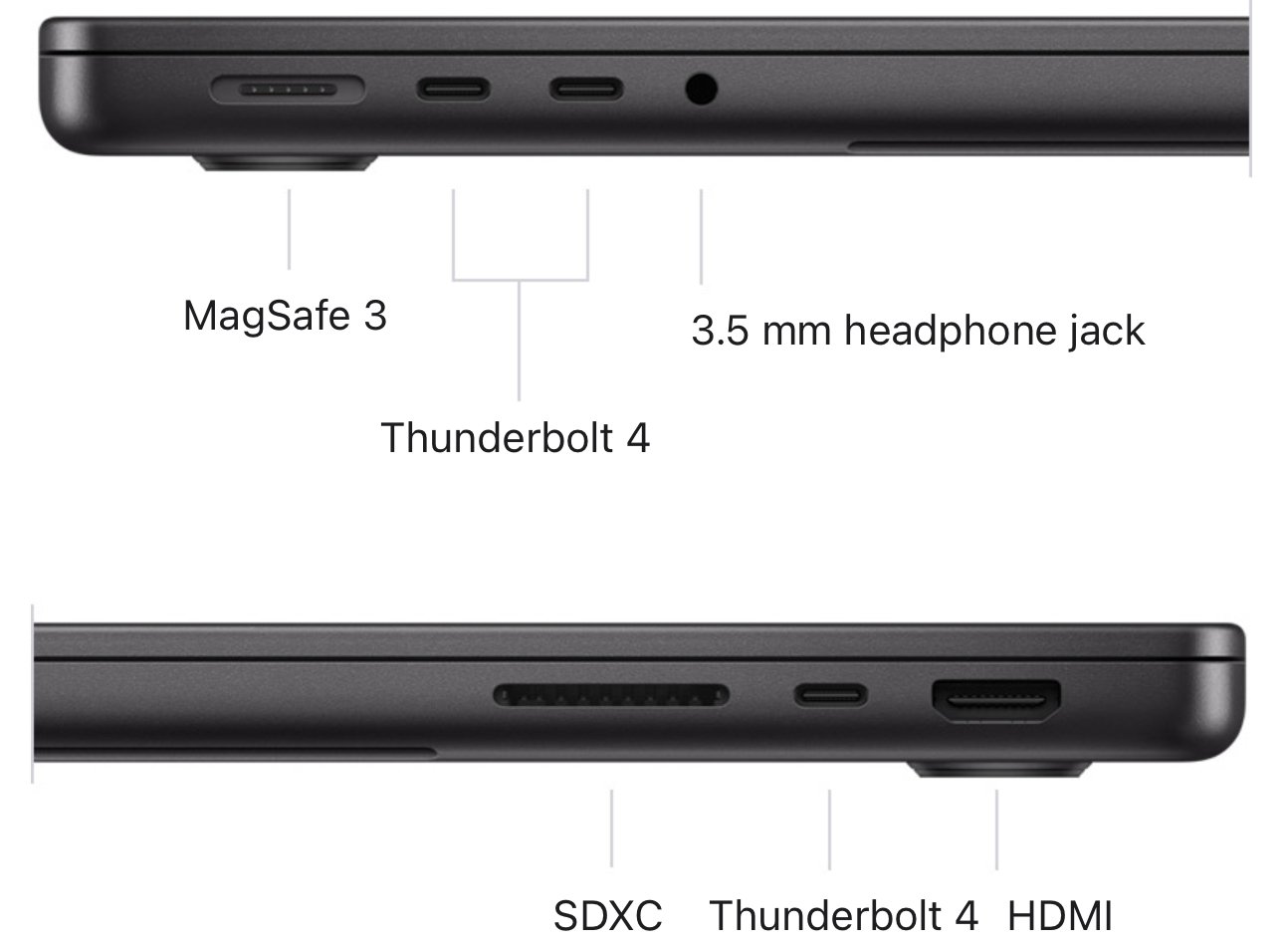
I dunno - I’m pretty sure I’d choose the modern MacBook Pro’s ports over any of these other options.
We’re mindlessly bashing Apple here, we don’t need your sensible reasoning!
From my personal experience Apple products aren’t as great as the fanboys claim but are far far better than they haters say they are.
Where do you see Apple bashing? Most comments are about the general state of notebook ports.
Continue bashing, they use apple maths and only have ports on expensive models.
That picture is from the tech specs page of the base 14-inch
An ethernet port is essential for any computer.
Exactly! What are you going to do if your router dies (or you mess something up fiddling w/ things)? I may only need it once/year or so, but when I do, it’s really important and I most likely can’t find the dongle.
An RJ-45 port could totally fit on there if they used one of those flip-down things that Dell has on their professional line.
I just this … https://a.co/d/ijxaPae
Only issue I have is max 65W PD, which should be fine for most laptops, but some laptops can charge at 100W.
Yeah M1+ Macs are great. I say this as a diehard Apple hater
Zero USB-A ports? Hell, no…
I have an M2 Air, and all mine is missing from that is the SDXC slot, third TB4 and HDMI, and honestly, it’s fine. A third TB4/USB would be nice for when I’m doing my radio show and have to plug in my controller and mic while also charing my phone, but I already have a hub so it doesn’t bother me.
That said, the limited ports on my M1 mini are quite problematic. Two TB3/USB and two USB3, but one of them is lost to a DisplayPort cable for my second monitor. So I have a desktop computer that functionally has three USB sockets, which ain’t great. But again, I have a hub, so it’s not a huge problem.
Power, HDMI, a few USBs, and headphones, all you’ll ever likely need.
There’s no doubt a dongle for anything else.
Yes, and it’s better to be downgrading USB-C ports with adapters than to be stuck adapting a USB-A port to USB-C or ethernet.
Cause I live toting a do gle around and risk breaking the laptop because of it.
I did enough of that in the 90’s, TYVM
in the ’90s*
Username checks out.
SD card reader is nice to have if you fuck around with cameras and microphones.
Cause I live toting a do gle around and risk breaking the laptop because of it.
I did enough of that in the 90’s, TYVM
in the ’90s*
Unless you want a desk setup. I have 2 monitors, kb, mouse, external dac, usb extension for thumbdrives, ethernet, usb soundcard for my mic and a kvm. That’s dp, hdmi, 6 usb-a, ethernet and I still sometimes plug-in 1-3 devices to charge them.
With that many connections, using a dock or a monitor with thunderbolt seems more practical than having a ton of stuff plugged into your laptop.
It’s not about it being practical. It’s about if it’s actually doable or not and how well it would work. Having the native ports will always be better that using a hub/dock.
Strongly disagree. I use a laptop with a thunderbolt dock. Being able to plug in a single cable to provide power, connect my monitor, all of my input devices, Ethernet, and anything else in a single cable is awesome. If I had to plug 10 things in manually it would be quite cumbersome. I disconnect the laptop daily as I bring it between work and home, as well as use it, well, as a portable laptop.
Kudos to you.
What you could do now is step out of your bubble and consider that other people have different use cases and might need or prefer to have more native ports.
You literally lose nothing by having more connectivity options.
Except the device inevitably ends up bigger and chunkier.
Yeah, because plugging in one thing is way harder than plugging in six.
This is a classic use case for a laptop dock.
That’s a very lazy, short-sighted and first world problem way of looking at this issue.
Why would having the option of using either a hub or plugging things on separately be worse than only being able to use a hub?
Because I don’t want a chonky boi laptop to carry around.
It sounds like you need a desktop computer or a docking station.
Like I already said to another user: No. There are more than a few use cases that require a mobile set up for demos for example but that you’d also want to use in a desk setting. For example, architects or sw dev.
Why are you making an effort to justify getting shafted by corporations?
In this situation a hub is still better. You can pack all the stuff away plugged into the hub for easier set up. If your plugging that all into your laptop, you’ll need to plug it all back in again when you move.
Which might be an issue for you but it’s not for me. Also, I prefer the flexibility to have all of the ports I might need, natively.
We aren’t justifying getting shafted by corporations. What I and the other person are saying is that at some point as your connections and cables multiply, you need to consolidate and streamline your setup for it to be more practical and actually mobile. I’m all for having all the basic necessity ports on my laptop, but when your desk ends up as a mess of cables and pulling out and putting back your laptop becomes bothersome with having to attach/re-attach everything every time, having a dock makes it much simpler. Subjecting yourself to setting up all those cables on both ends instead of just one end is the opposite of having a mobile workstation for quick setup and cleanup.
You’re still missing the forest for the trees.
There’s no real reason why you’d have to choose having a few ports + a hub or tons of ports + the option of using a hub.
If you prefer to “consolidate” your devices to a single poinf of failure on an external device then by all means, go ahead. I just think that it’s pretty crappy that options are being artificially limited and users of all people are making excuses for it.
That’s a use case for a laptop dock if ever there was one.
If you got that kind of money to spend on a laptop, sure. I really don’t.
Edit: to be clear, I know this is a stack of Mac’s in OPs picture, but the development that the entry models have basically no ports at all is a more recent development. Having to pick the pro just to be able to connect your stuff without dongles or hubs is a bit insane considering the price (and price difference).
It really depends on what you use your laptop for. My 2013 MBP lasted 9 years and was how I got my work done. That comes out to 76¢ per day, and I make a fair bit more than that per hour.
But if you’re looking for a personal computer to surf the internet, yes, that could be cost prohibitive. But then it also matters less what device you buy.
As for ports, I’ve never needed a dongle on the 2013 model. I did need one for a USB A drive on the newest model, but this little thing has solved that problem easily. I didn’t even have to buy that since my monitor has USB A ports – I was just too lazy to reach around the back to use it every time. I’m not sure I understand all the complaints about the occasional need for a dongle.
Yeah, props to Apple for bringing back the card reader and HDMI. When I bought my early 2015 MBP I specifically went with the older model because these ports were removed on the newer one which also came with the shitty butterfly keyboard as well which they’ve also since discontinued.
I miss having a thousand different cables to keep track of /s
really, all we need is the companies to start packing those laptops with thunderbolt3 or equivalent USB-C (USB 4). I love the old ports, but they were unnecessary. I’d rather the industry finally takes on the open thunderbolt standard and we’re all good to go. With 10 thunderbolt ports you have 10 HDMI, or 10 USB, or 10 Ethernet, or 10 headphone jacks, or 10 RJ45 or whatever you need + PCIe tunneling.
Fuck firewire. Glad it’s dead. USB C is the best thing to happen to peripherals since the mouse.
USB C is the best thing to happen to peripherals since the mouse.
I would agree with you if there were a simple way to tell what the USB-C cable I have in my hand can be used for without knowing beforehand. Otherwise, for example, I don’t know whether the USB-C cable will charge my device or not. There should have been a simple way to label them for usage that was baked into the standard. As it is, the concept is terrific, but the execution can be extremely frustrating.
Hey that’s a fair point. Funny how often good ideas are kneecapped by crap executions.
I’m pretty sure the phrase “kneecapped by crap executions” is in the USB working groups’s charter. It’s like one of their core guiding principles.
If anyone disagrees with this, the original USB spec was for a reversible connector and the only reason we didn’t get to have that the whole time was because they wanted to increase profit margins.
That’s the reason Apple released the Lightning connector. They pushed for several features for USB around 2010, including a reversible connector, but the USB-IF refused. Apple wanted USB-C, but couldn’t wait for the USB-IF to come to an agreement so they could replace the dated 20-pin connector.
USB has always been reversible. In fact you have to reverse it at least 3 times before it’ll FUCKING PLUG IN.
Buying a basic, no-frills USB-C cable from a reputable tech manufacturer all but guarantees that it’ll work for essentially any purpose. Of course the shoddy pack-in cables included with a cheap device purchase won’t work well.
I replaced every USB-C-to-C or -A-to-C cable and brick in my house and carry bag with a very low cost Anker cable (except the ones that came with my Google products, those are fine), and now anything charges on any cable.
You wouldn’t say that a razor sucked just because the cheap replacement blades you bought at the dollar store nicked your face, or that a pan was too confusing because the dog food you cooked in it didn’t taste good. So too it is not the fault of USB-C that poorly manufactured charging bricks and cables exist. The standard still works; in fact, it works so well that unethical companies are flooding the market with crap.
Burn all the USBC cables with fire except PD. The top PD cable does everything the lower cable does.
IDK I’ve had PD cables that looked good for a while but turns out their data rate was basically USB2. It seems no matter what rule of thumb I try there are always weird caveats.
No, I’m not bitter, why would you ask that?
There are many PD cables that are bad for doing data.
Correct. The other commenter is giving bad advice.
Both power delivery and bandwidth are backwards compatible, but they are independent specifications on USB-C cables. You can even get PD capable USB-C cables that don’t transmit data at all.
Also, that’s not true for Thunderbolt cables. Each of the 5 versions have specific data and power delivery minimum and maximum specifications.
You can even get PD capable USB-C cables that don’t transmit data at all.
I don’t think this is right. The PD standard requires the negotiation of which side is the source and which is the sink, and the voltage/amperage, over those data links. So it has to at least support the bare minimum data transmission in order for PD to work.
Technically, yes, data must transmit to negotiate, but it doesn’t require high throughput. So you’ll get USB 2.0 transfer speeds (480 Mb/s) with most “charging only” USB-C cables. That’s only really useful for a keyboard or mouse these days.
This limitation comes up sometimes when people try to build out a zero-trust cable where they can get a charge but not necessarily transfer data to or from an untrusted device on the other side.
You forgot thunderbolt and usb4 exists now
True but pretty much the only devices that need those are high-end SSDs and laptop docks and in both cases you just leave the cable with the device rather than pulling it out of your generic cables drawer.
You forgot thunderbolt and usb4 exists now
You can buy a single cable that does 40GB and USB4 and charges at 240w.
There should have been a simple way to label them for usage that was baked into the standard.
There is. USB IF provides an assortment of logos and guidelines for ports and cables to clearly mark data speed (like “10Gbps”), power output (like “100W” or “5A”), whether the port is used for charging (battery icon), etc. But most manufacturers choose not to actually use them for ports.
Cables I’ve seen usually are a bit better about labeling. I have some from Anker and ugreen that say "SS”, “10Gbps”, or “100W”. If they don’t label the power it’s probably 3A and if they don’t label the data speed it’s usually USB 2.0, though I have seen a couple cables that support 3.0 and don’t label it.
I would agree with you if there were a simple way to tell what the USB-C cable I have in my hand
https://caberqu.com/home/39-ble-caberqu-0611816327412.html
This would do it.
Damn, check out the price of the thing someone else linked to at AliExpress for a fraction of that price. But having to spend money on that should not be necessary.
That aliexpress device doesn’t tell you what wattage or data speed the cable will max out doing. Just what wattage it’s currently doing (to which you’d need to make sure that the device you’re testing with on the other side is capable and not having it’s own issues). Also can’t tell you if the cable is have intermittent problems. If all you care about is wattage, then fine. But I find myself caring more about the supported data speeds and quality of the cable.
But yes, I agree that cables should just be marked what they’re rated for… However it’s possible well built cables exceed that spec and could do better than they’re claiming which just puts us in the same boat of not really knowing.
Edit: oh! and that aliexpress tester is only 4 lines(usb2.0 basically)… usb 3.0 in type c is 24 pins… You’re not testing jack shit on that aliexpress. The device I linked will actually map the pins in the cable and will find you breaks as well.
The cheaper aliexpress item you actually want is this one, it will read the emarker and tell you the power/data rates it supports, if it supports thunderbolt etc https://www.aliexpress.com/item/1005007287415216.html
Some photos of it in action https://bitbang.social/@kalleboo/109391700632886806
Do not all USB C cables have the capability to do Power Delivery? I thought it was up to the port you plugged it in to support it?
The really janky ones you get with like USB gadgets like fans only have the 2 power lines hooked up and not the lines needed to communicate PD support, those will work exactly the same as the same janky USB A-microUSB cables they used to come with, supplying 5V/2A. You throw those away the second you get them and replace them with the decent quality cables you bought in bulk from AmazonBasics or something.
Nope. My daughter is notorious for mixing up cables when they come out of the brick. Some charge her tablet, some are for data transfer, some charge other devices but not her tablet. It’s super confusing. I had to start labeling them for her.
Come to think of it, all the USB C cables I have are from phone and device chargers so I just took it for granted. Good to know. Thanks for sharing some knowledge with me
USB-c cables can vary drastically. Power delivery alone ranges from less than 1 amp at 5 volts to over 5 amps at 20 volts. That’s 5 watts of power on the low end to 100 watts of power on the high end and sometimes more. When a cable meant to run at 5 watts has over 100 watts of power run through, the wires get really hot and could catch fire. The charger typically needs to talk to a very small chip in the high power cables for the cables to say, yes I can handle the power. Really cheap chargers might just push that power out regardless. So while the USB-c form factor is the one plug to rule them all, the actual execution is a fucking mess.
I agree with USB-C, but there are still a million USB-A devices I need to use, and I can’t be bothered to buy adapters for all of them. And a USB hub is annoying.
Plus, having 1-2 USB-C ports only is never gonna be enough. If they are serious about it, why not have 5?
I bought some adaptors in China for around $0.50 each. It really isn’t that big of a deal
It really is a big deal for me, they stick out too far and are making the whole setup flimsy.
Then just buy a framework like I did and switch ports whenever you feel like it
That’s still only 3 simultaneously if I saw that right. My old Lenovo laptop had 3 USB-A 2.0 ports, 2 x USB-A 3.0, RJ45 and HDMI. That was gold. Everything that comes now is a bloody chore.
You can have 6 ports of any kind you like on the framework 16
Oh nice, that’s something.
Yeah, I’d love at least one USB A type cause most of the peripherals I own use that.
You can’t buy a UCB-C Wifi dongle that last time I checked. You have to buy a c-to-a adapter, then use a usb-a wifi dongle. It’s nuts that those don’t exist.
Genuine question - what device do you have that has USB-C ports, no USB-A ports, doesn’t have WiFi, but supports the dongle?
Pinetab2 shipped with a wifi chip without any Linux drivers. The drivers eventually got made, but before that, you needed a USB dongle with Ethernet or a adapter.
I would also like a USB-c wifi dongle for tech support reasons. Sometimes, the wifi hardware fails and you need a quick replacement to figure out what happened.
Why do you need a wifi dongle when wifi is built into every single laptop sold?
Maybe the preferred Linux distro doesn’t work with them. I had to use another distro for a while because Debian didn’t immediately support the card, but there are apparently cases where the internal card just permanently wouldn’t work (like in fully free software distros). I would rather replace the card inside the laptop than use a dongle, but idk if this can always be the answer.
Nah, USB-A was the best since it replaced serial ports (esp PS/2, which was much harder to plug in) and outlived/outclassed FireWire. USB-C is the best thing since HDM (screw you VGA amd DVI), which was the best since USB-A.
I hated when mice became the primary interface to computers, and I still do.
tell me you use i3 without telling me you use i3
You have passed the test. We can be friends.
Is this for real?
Even for like 20 years after mousing became the primary interface, you could still navigate much faster using keyboard shortcuts / accelerator keys. Application designers no longer consider that feature. Now you are obliged to constantly take your fingers off home position, find the mouse, move it 3cm, aim it carefully, click, and move your hand back to home position, an operation taking a couple of seconds or more, when the equivalent keyboard commands could have been issued in a couple hundred milliseconds.
I love how deeply nerdy Lemmy is. I’m a bit of a nerd but I’m not “mice were a mistake” nerd.
I don’t think mice were a mistake, but they’re worse for most of the tasks I do. I’m a software engineer and I suck at art, so I just need to write, compile, and test code.
There are some things a mouse is way better for:
- drawing (well, a drawing tablet is better)
- 3d modeling
- editing photos
- first person shooters (KB works fine for OG Doom though)
- bulk file operations (a decent KB interface could work though)
But for almost everything else, I prefer a keyboard.
And while we’re on a tangent, I hate WASD, why shift my fingers over from the normal home row position? It should be ESDF, which feels way more natural…
Thanks, I got you beat on ESDF though because i’m a RDFG man, since playing counter strike 1.6. With WASD they usually put crouch or something on ctrl but my pinky has a hard time stretching down there, but on RDFG my pinky has easy access to QW AS ZX, and tab caps and shift with a little stretch. It’s come in handy when playing games with a lot of keybinds.
Pfff, minutes after trying to minimize your nerdiness, you post this confession.
What pisses me off even more is many games bind to the letter instead of physical key position (e.g. key code), so alternative layouts get a big middle finger. I use Dvorak, and I’ve quit fighting and just switch to QWERTY for games.
I don’t have a problem with hitting control (I guess I have big hands), but I totally agree that default key binds largely suck. I wish games came with a handful of popular ones, and bound to key codes so hs Dvorak users (or international users) didn’t have to keep switching to QWERTY.
I always rebind to ESDF if the game doesn’t do stupid things preventing it from being practical. The addition of the 1QAZ strip being available to the pinky is a killer feature all on its own. I typically use that for weapon switching, instead of having to stretch up to 1234 and take my fingers off the movement keys.
Tablets are better than mice at drawing, modelling, and photo editing. Mice are good for first person shooters. Game controllers are better for most other games. You can mouse in
dired-modei guess, if you’re a casual.The problem is they generally use E and F for something, which results in a cascade of rebinding.
And yeah, tablets are better, but they’re also more expensive and don’t do other mice things. For how rarely I do 3D modeling and whatnot (pretty rare), making sure my mouse has a middle button is plenty.
And yeah, I much prefer controller, even for FPS since I don’t play competitively (even then, I’ve seen awesome videos about gyro aiming).
That functionality (first necessary, then required by guidelines, then expected, and then still usual) disciplined UI designers to make things doable in a clear sequence of actions.
Now they think any ape can make a UI if it knows the new shiny buzzwords like “material design” or “air” or whatever. And they do! Except humans can’t use those UIs.
BTW, about their “air”. One can look at ancient UI paradigms, specifically SunView, OpenLook and Motif (I’m currently excited about Sun history again), Windows 3.*, and also Win9x (with WinXP being more or less inside the same paradigm). And one can see that of these only Motif had anything resembling their “air”. And Motif is generally considered clunky and less usable than the rest of the mentioned (I personally consider OpenLook the best), but compared to modern UIs even Motif does that “air” part the way it seems to make some sense, and feels less clunky, making me wonder how is that even possible.
FFS, modern UI designers don’t even think it’s necessary to clearly and consistently separate buttons and links from text.
And also - freedom in Web and UI design has proven to be a mistake. UIs should be native. Web browsers should display pages adaptively (we have such and such blocks of text and such and such links), their appearance should be decided on the client and be native too, except pictures. Gemini is the right way to go for the Web.
So I see you clearly haven’t heard of i3, sway or hyperland …
Sounds like I’m glad “home row” style typing fell out of favour. It may be the theoretically fastest way to type eventually, but it seems to lead to pretty rigid behaviour. Adapting to new things as they come along and changing your flow to move with them instead of against them is just a much more comfortable way to live. Even if I only type 80% as fast.
I have no idea what you mean by “fell out of favour”. Does your keyboard not have pips on F and J? People still touch type. Dunno what to tell you.
You’re getting hung up on “home row”. You still have to move your hand from the keyboard to the mouse and back. It’s the same problem, whether or not you know how to type well and stare at your hands, except now you have to add steps for “look at the screen” and “look back at your hands”.
Fell out of favour in that it isn’t taught as “the correct way to type” any more. Largely because most devices you type on now wouldn’t even have physical keys. So learning home row typing for the occasional time the thing you are typing on is a physical full sized keyboard just disrupts the flow of everything else.
Being perfectly optimal isn’t as productive as it feels, especially when it leads to resistance to change and adapt.
Home row is absolutely still taught as the “correct” way to type. Source: kids are in elementary school
I dont know why this is controversial. I’m way more happy with 4x USB-C, than 5 unique ports, that will likely never be used on a regular basis, even when they were relevant
How about this:
- 4x USB-C (can’t see why I’d need 4 though, 3 is plenty)
- 2x USB-A
- HDMI
- RJ-45
- headphone jack
- microsd
That should still fit just fine on the chassis if they didn’t do the stupid curve thing, and it certainly wouldn’t make it thicker.
Especially the HDMI and jack are just silly to drop.
I honestly wish every company would just stop using USB A. So many companies still including it are preventing device manufacturers from going all in on C.
Going forward, this is the way. However, there is a massive amount of usba legacy hardware like mouse/keyboard dangles, headsets, hubs, chargers, and other less universally available products. Just think about how long PS2 and VGA ports existed on montherboards.
What’s wrong with having the option?
The more its held onto on devices, the more things will just keep using it. If we had ditched USB A on new devices (desktop motherboards included) companies would start actually releasing USB C peripherals and other devices. Think mouse dongles, keyboards, speakers, etc.
I honestly don’t really see that as a problem. If customers really want USB-C, they’ll buy USB-C peripherals and USB-A will drop off naturally. But if USB-A peripherals are more attractive (i.e. cheaper), then I see no problem with both continuing to exist. Let the people decide, don’t force USB-C down their throats…
If customers really want USB-C, they’ll buy USB-C peripherals and USB-A will drop off naturally.
How? If there are basically no USB-C peripherals, how are people going to buy them to show their support? One side needs to start first so the other will get on board, otherwise people will just stick to USB-A because there is no other real option. Apple is trying, and they are usually the trendsetters in the tech space, but it doesn’t seem like the rest of the market is jumping on board like the usually do.
The people can’t decide if there isn’t anything to decide on.
There are USB-C peripherals though. I just did a quick check for “USB-C <thing>” (tried mouse, keyboard, and drive) and found plenty of options. The USB-A devices are frequently cheaper, probably because USB-A compliance is a lot easier than USB-C compliance, which translates to cheaper products.
If the market doesn’t jump to support USB-C, it’s probably because it’s either too expensive or customers don’t care. If neither is the case, the companies that make USB-C devices would make a killing and everyone else would rush to catch up.
I personally slightly prefer USB-C, but I don’t need everything to be USB-C. USB-A still works fine, and they work especially well w/ my older devices. What benefits do I get by switching to USB-C? Having everything the same is nice, but how much is that actually worth when it comes to extra costs?
RJ45 and HMDI in particular are way thicker than usb-c
True, yet they would totally fit, and do fit on the newer Macbook Pros. And many professional class laptops have RJ45 w/o making it any thicker (port flips down, so it doesn’t need to be full-height always).
RJ45 connectors are commonly a folding down connector. HDMI can be replaced with a micro HDMI and is often replaced with additional USBC to utilize display port alt mode.
They already come with what you ask, minus usb-a and honestly fuck usb-a
2024 16" macbook pro: https://support.apple.com/en-ca/121554
- Charging and Expansion
- SDXC card slot
- HDMI port
- 3.5 mm headphone jack
- MagSafe 3 port
- Three Thunderbolt 5 (USB-C) ports with support for:
- Charging
- DisplayPort
- Thunderbolt 5 (up to 120Gb/s)
- Thunderbolt 4 (up to 40Gb/s)
- USB 4 (up to 40Gb/s)
I would prefer 10x USB C than that shit, lol
There is still a headphone jack, it’s on the other side.
4 USBC would be cool. Most of these devices only have 2 or 3, minus 1 required for power delivery. If you have peripherals a hub is almost required.
Content note: shilling
Just had a look at the prices, I can get 128 GB of RAM for the price that Apple charge for 16 GB of RAM.
I’m tempted to get 128 GB of RAM just because, I definitely don’t need it.
It’s nuts. Framework marks up their RAM, and it’s still way cheaper through them than through Apple, and you can buy aftermarket RAM too.
My next personal laptop will probably be Framework, especially since nearly everything else is going soldered RAM.
deleted by creator
I do have 4, but except for extremely rare circumstances I only ever use one. A single USBC cable handles an external display, power, plus extra accessories like a keyboard via a built-in hub in the monitor. If you wanted to that monitor also supports daisy chaining another monitor without having to plug it into the laptop.
Obviously it’s quite a subjective thing, but if you happen to use tools from after USBC was a thing and your laptop routine is pretty established, I think you can get a ton of simplicity and function out of those ports.
That’s great for a docking station setup. But if all you need is docking stations at home and the office, just get a mini PC/ machine mini.
Laptops are supposed to be useful without a docking station, and if all you have is USB-C you can’t even read most thumb drives.
Well I also use my laptop in isolation away from those docked environments, so it is useful.
To be honest I’m not sure I’ve plugged in a USB drive in the last year, likely much longer. But I do keep a tiny A to C adapter in my bag, so if need be I can easily plug a traditional A connector in. If I were to buy a usb drive today I’d get a USB C or hybrid one.
Having to carry dongles and hubs to connect to devices severely impacts the convenience of a laptop.
I agree, but I really don’t do that. What I do remember 10 years back is carrying around a bunch of different cables for each of the ports I had, which is practically the same issue.
I only carried cables if I was carrying the device that required the cable. If I needed to plug into something where I was going, whatever device I was using had a USB-A cable already.
With .ost modern laptops, you have to carry a hub so you can use that cable.
You like a little baggy of dongles and adapters?
All you need is a travel dongle with hdmi displayport some USB-A and ethernet (If you really need that, tho) for me laptop screen on the go is good enough, have no usb-A devices (and those who have are upgraded to C using permanent usb legacy adapter mounted on the cable) and on the go, wifi/hotspot is good enough.
At home, ethernet and USB A are connected through the usb C 4k monitor.
I’ve got an external screen that connects with a USB-C-to-C cable to that thunderbolt port.
Finding a cable supporting that is harder though, it needs both Power Delivery(PD) as DisplayPort(DP), and most cables don’t support the bandwidth for DP.
Apple has always been an appearance over function company.
The desktop equivalent is “What happened to all my PCIe expansion slots?!”
(Note: processor PCIe lane count has gone up, used to be like 16 from CPU, 4 from chipset, since a GPU didn’t need an x1x6 in terms of bandwidth - see SLI/crossfire. These days, it’s just that many lanes go to M.2, with each using up to 4 lanes - vs having 6 SATA driven off the chooser)
I actually prefer the standardization here. Sick of having 2 boxes of different cords.
My current phone lacks a headphone jack and I hate it. It would be okay if it was replaced with two usb c ports, but there’s only one which means I either choose between headphones or charging, or I must use an adapter. Or wireless, but I don’t want yet another fucking battery to charge.
As long as a computer has 4 usb-c ports, I think you’re covered for everything.
Yes we had more different ports back in the days, but most were never used.
Usb-c is way more practical. Still that implies that you have more than 2 Usb-c ports.
Yeah guys it’s way more practical to carry 11 usb c dongles everywhere you go
That’s the most straw in a straw man I’ve seen in the whole thread.
Most new laptops have USB-C, A, and SD/micro SD, and HDMI. That’s 95% of all uses.
If you really need more then you just bought the wrong laptop. Get a Thinkpad or framework 16. If you need to interface with old hardware, get a contemporary machine.
OK, but that wasn’t the example shown or example given.
That configuration above (and often one of those collapsible Ethernet ports) makes a lot of sense. And a headphone jack. But that’s a LOT different than just USB-C, which was the complaint.
I actually carry a single USB adapter completely covered in ports.
At work both my monitors and networking go through the same port. The monitor also acts as a usb hub.
You can buy an adapter and plug everything in one port.
I love it personally.
You can only do that because your monitors are not high resolution and high refresh rate. The data cap for usb-c is not that high.
USB-C is just a connector, but Thunderbolt 5 uses it and for asymmetric uses (e.g. a monitor) it can hit 120Gbps.
Isn’t that going to support most monitors?
Please, list the devices that you know have tb5.
Also, that’s the total bandwidth in a best case scenario. You’re not factoring in that you’ll need to share that with all of the devices in a hub. That’s without mentioning that you need the hub (which also has a cost).
The USB4 protocol can handle 160Gb/s split asymettrically (so, say, 120Gb/s out, 40Gb/s in), wheras the upper limit for DisplayPort’s highest bandwidth mode, Quad UHBR 20, is 80Gb/s in one direction. So you can saturate your DisplayPort 2.0 quad-channel with more than enough bandwidth to power three 10K 60Hz 30-bit (i.e. very high-end) monitors in DSC mode, and still only be using half the bandwidth of USB4, all using a single cable which I can also use to charge my earphones.
Most devices only have 40gbps USB4. Which is still enough for almost all sane use cases. Frankly, if you need multiple 4K monitors get a desktop.
Uhm no? There are more than a few use cases that require a mobile set up for demos for example but that you’d also want to use in a desk setting. For example, architects or sw dev.
Which is still enough for almost all sane use cases.
Like 2 4k60 monitors and literally nothing else? You have a very conservative opinion of what a “sane” use case is. Not to mention that lots of USB-C cable certification is a mess so not even getting the cable is simple (or cheap).
Can you break this down?
The 2017 model pictured in this post supported Thunderbolt 3, which was a 40 gbps connection. Supported display modes included up to 4k@120, 2x4k@60, or 5k@60, which was better than the then-standard HDMI 2.0.
What combination of resolution, frame rate, and color depth are you envisioning that having a dock handle a gigabit Ethernet connection, analog audio would require scaling down the display resolution through the same port?
By 2021, the MacBook Pros were supporting TB4, and the spec sheets on third party docking stations were supporting 8k resolutions, even if Macs themselves only supported 6k, or up to 4x4k.
Even if we talk about DisplayPort Alt Mode, a VESA standard developed in 2014, and supported in the 2017 models pictured in this post, that’s just a standard DP connection, which in 2017 supported HDR 5k@60. But didn’t support a whole separate dock with networking and USB ports.
Supported display modes included up to 4k@120, 2x4k@60, or 5k@60
Right, for a single device.
What combination of resolution, frame rate, and color depth are you envisioning that having a dock handle a gigabit Ethernet connection, analog audio would require scaling down the display resolution through the same port?
Dual 4k120 would already saturate the bandwith. Regarding networking, gigabit is pretty slow for LAN depending on your workload. If you were to require 10gbit, you’d be SOL.
By 2021, the MacBook Pros were supporting TB4, and the spec sheets on third party docking stations were supporting 8k resolutions, even if Macs themselves only supported 6k, or up to 4x4k.
Did you read the specs in your link? Even with that TB4 dock you wouldn’t be able to do dual 4k120.
I really don’t get trying to justify manufacturers forcing you to buy an additional device to get the same ports they could provide natively without using a hub/dock. It’s a pretty submissive attitude.
Dual 4k120 would already saturate the bandwith.
What would you use to drive dual 4k/120 displays over a single cable, if not Thunderbolt over USB-C? And what 2017 laptops were capable of doing that?
Even if we’re talking about two different cables over two different ports, that’s still a pretty unusual use case that not a lot of laptops would’ve been capable of in 2017.
4k120 panels weren’t even available in 2017 afaik. But you could do dual 4k120 with one hdmi 2.1 and 1 displayport 1.4 so just need 2 video outputs from your laptop (which used to be pretty common).
Please note that we’re having this discussion in 2024 and I’m talkimg about use cases in 2024. I don’t really see the point in talking about what you would theoretically do 6 years ago with panels that weren’t even available.
Problem: This is what happens when you pick Apple.



